|
|
|
Sort Order |
|
|
|
Items / Page
|
|
|
|
|
|
|
| Srl | Item |
| 1 |
ID:
133668


|
|
|
|
|
| Publication |
2014.
|
| Summary/Abstract |
Washington's current efforts to resolve the conflict in Syria will not break the stalemate. The only way to restore peace without committing U.S. troops is to build a new Syrian army capable of defeating both the Assad regime and the extremists.
|
|
|
|
|
|
|
|
|
|
|
|
|
|
|
|
| 2 |
ID:
132148
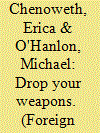

|
|
|
|
|
| Publication |
2014.
|
| Summary/Abstract |
Over the past three years, the world has witnessed a surge of nonviolent resistance movements. Pictures of huge demonstrations in public squares have become a staple of international news broadcasts, and Time named "the protester" as its Person of the Year for 2011. These days, it seems that at any given moment, thousands of people are mobilizing for change somewhere in the world.
|
|
|
|
|
|
|
|
|
|
|
|
|
|
|
|
| 3 |
ID:
134010
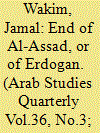

|
|
|
|
|
| Publication |
2014.
|
| Summary/Abstract |
In this article, I argue that Turkish Prime Minister Recep Tayyip Erdogan wanted to improve relations with Syria because he wanted Turkey to play a leading role in the Arab world. This role is promoted by the United States which aims at creating an alliance between Turkey and the Arab states to block Russia, China, and Iran from having access to the East Mediterranean or the Indian Ocean. Turkey's reward would be to have access to Arab markets and oil. Syrian President Bashar al-Assad was tempted by the United States, Turkey, and conservative Arab regimes to sever his ties with Iran, which he refused to do. Therefore, the former powers supported the Syrian uprising (which started as domestic protests against dictatorship, corruption, and misrule) to topple al-Assad. However, two and half years since the Syrian uprising started, the al-Assad regime seems to be resisting the attempts of his opponents to topple it, which would mean a failure of Erdogan in his political bet and might even lead to his downfall, especially after the eruption of protests against Erdogan throughout Turkey in early June 2013.
|
|
|
|
|
|
|
|
|
|
|
|
|
|
|
|
| 4 |
ID:
127463
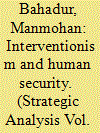

|
|
|
|
|
| Publication |
2014.
|
| Summary/Abstract |
The conflict in Syria is inexorably turning into a quagmire as more entities get dragged into the sludge. From a hands-off policy to one of humanitarian support, the West has progressed to arming rebels, while Russia has shown that it is determined not to let down its ally by continuing arms shipments to the Assad regime. Meanwhile, other actors are chipping in to add to the misery; the latest reports refer to Sudan sending arms to rebels through (and financed by) Qatar.1 As the crisis meanders into its third year, the chant of greater proactiveness from human security proponents is getting louder, reminiscent of international interventions of the past two decades in various parts of the world.
|
|
|
|
|
|
|
|
|
|
|
|
|
|
|
|
| 5 |
ID:
120054
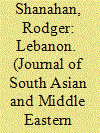

|
|
|
| 6 |
ID:
134205
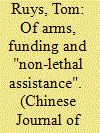

|
|
|
|
|
| Publication |
2014.
|
| Summary/Abstract |
In spite of legal objections, the European Union (EU) in May 2013 gave the conditional green light for the transfer of arms to the Syrian Opposition Council. The EU's decision is not a solitary move. Several other States, including Russia, the United States, Qatar and Saudi Arabia, have provided arms, funding and/or "non-lethal assistance" either to the Syrian government or to rebel forces combatting the Assad regime. The present contribution aims to shed light on the legality of such assistance. On the one hand, it assesses legal objections related to the fact that third-State assistance is used for the commission of widespread war crimes and human rights violations. On the other hand, it examines the compatibility of such assistance with the non-intervention principle and, in so doing, examines to what extent the latter principle discriminates between de jure governments and non-State armed groups in the context of a civil war.
|
|
|
|
|
|
|
|
|
|
|
|
|
|
|
|
| 7 |
ID:
132830
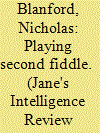

|
|
|
|
|
| Publication |
2014.
|
| Summary/Abstract |
Despite some success in stemming overspill from Syria, the Lebanese armed forces (LAF) have been perceived as a secondary line of defence after Hizbullah. Nicholas Blanford examines the LAF's complicated relationship with the Shia militant group.
|
|
|
|
|
|
|
|
|
|
|
|
|
|
|
|
| 8 |
ID:
130864
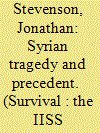

|
|
|
|
|
| Publication |
2014.
|
| Summary/Abstract |
If Washington's Syria policy succeeds, it will crystallise efforts to privilege diplomacy over the use of force and create a precedent other powers will be apt to follow. The United States' present Syria policy is perhaps the most vivid, and discomfiting, example of the Obama administration's realism. Its military forbearance, even in the face of a burgeoning humanitarian crisis (over 150,000 Syrians have died in just over three years) and the Assad regime's use of chemical weapons, has been resolute. Its focus on using diplomacy instead of military power has been firm, if vexing. These traits suggest three strategic clean breaks from the George W. Bush administration's post-9/11 policy. Firstly, they imply recognition by the US that major wars remain possible and cannot be subordinated to 'small wars' of choice. Secondly, they indicate that the counter-insurgency tools developed for expeditionary deployments to Iraq and Afghanistan have been rejected as instruments of policy. Thirdly, they subsume a determined effort at rapprochement with Iran and, more broadly, an approach to Middle Eastern affairs that is substantially less confrontational and heavy-handed.
|
|
|
|
|
|
|
|
|
|
|
|
|
|
|
|
| 9 |
ID:
131152
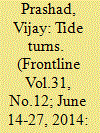

|
|
|
|
|
| Publication |
2014.
|
| Summary/Abstract |
Even as the Syrian army beats back the rebels in key areas, the massive turnout in support of Assad in the presidential election drives home the point that Syrian are sick of the war that has destroyed the country
|
|
|
|
|
|
|
|
|
|
|
|
|
|
|
|
|
|
|
|
|